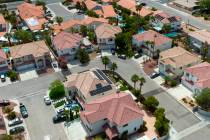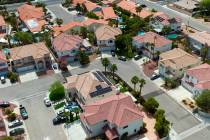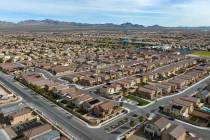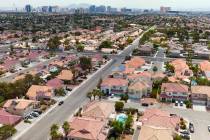Nevada foreclosure sales rise sharply in March
Nevada foreclosure sales jumped sharply in March, rising 109.5 percent from February on a daily average basis, Discovery Bay, Calif.-based ForeclosureRadar.com reported Tuesday.
Notice of default filings rose 9.7 percent from February overall, but decreased 10.4 percent on a daily average basis after adjusting for additional days in March. Notice of trustee sale filings increased 24.9 percent month over month, but just 3.1 percent on a daily average basis.
More significantly, real estate-owned, or bank-owned, sales skyrocketed 159.8 percent, and sales to third parties jumped 143.8 percent from February 2011.
Even when viewed on a daily average basis, those increases were dramatic, with a 53.4 percent increase for sales back to bank and a 50.3 percent increase for properties sold to third parties.
One of the reasons foreclosures fell in February was a lower-court ruling against Recon Trust, a major trustee for Bank of America, said Mark Skilling, chief operating officer of ForeclosureRadar. The order was overturned by a federal court in February.
“This month, we see a little yo-yo action going on because sales are back up dramatically,” Skilling said. “You’re kind of back to normal in terms of sales back to the bank.”
Las Vegas saw 2,120 homes go to foreclosure in March, the largest gross count in more than a year, he said.
Average time from notice of default to foreclose rose to 322 days in Nevada, up 16.3 percent from the prior month and longer than anywhere else in ForeclosureRadar’s coverage area, Skilling noted.
Clark County REO sales soared 166 percent over February and third-party sales rose 140 percent. However, foreclosure filings also rose 10.47 percent for notices of default and 27.11 percent for notices of sale. Inventories in the county changed less than 10 percent from last month.
In Washoe County, REO sales rose 126 percent and third-party sales were up 160 percent over last month. Filings rose less than 10 percent and bank-owned inventories rose only 5 percent.
Anna-Lena Thomas of Windermere Real Estate in Anthem Hills wants to know why banks aren’t foreclosing on more homes. Are the homes tangled in title issues or are the banks just going to put one house on the market at a time to make more money?
She found 64 homes with more than 2,400 square feet in the Green Valley Ranch subdivision that had received a notice of default, some as early as 2008. Only four are listed as short sales and none of them show up as notice of trustee sale, or foreclosure.
“The rest are just sitting out there, vacant or not, but no one is making the payments,” Thomas said. “It’s OK to not make your payments. Banks don’t want to sell cheap. Our market bottom looks really long. People are afraid of deficiency judgments and don’t want to short-sell.”
Skilling of ForeclosureRadar said the Realtor is “dead on” with what’s happening. Actual REO inventory hasn’t increased that much in Las Vegas and there’s no greater pressure on banks to release them than there’s always been, he said.
“The dilemma the bank faces is they may have to recognize losses if they sell REOs. The servicers that are working for them are making money, so there’s not a lot of pressure to move that inventory into the market,” Skilling said.
Foreclosure sales in California increased 35.1 percent overall, but rose just 10.5 percent on a daily average basis.
A report from Equity Title of Nevada, prepared by Forrest Barbee, showed 2,099 REO sales in Las Vegas in March, or roughly half of total sales, at an average price of $112,482. Short sales, or homes sold for less than the principal mortgage, totaled 1,443 during the month (24 percent) at an average price of $138,544. Available REO inventory remains steady at 2,809, while available short-sale inventory was 7,601.
Contact reporter Hubble Smith at hsmith@reviewjournal.com or 702-383-0491.


















